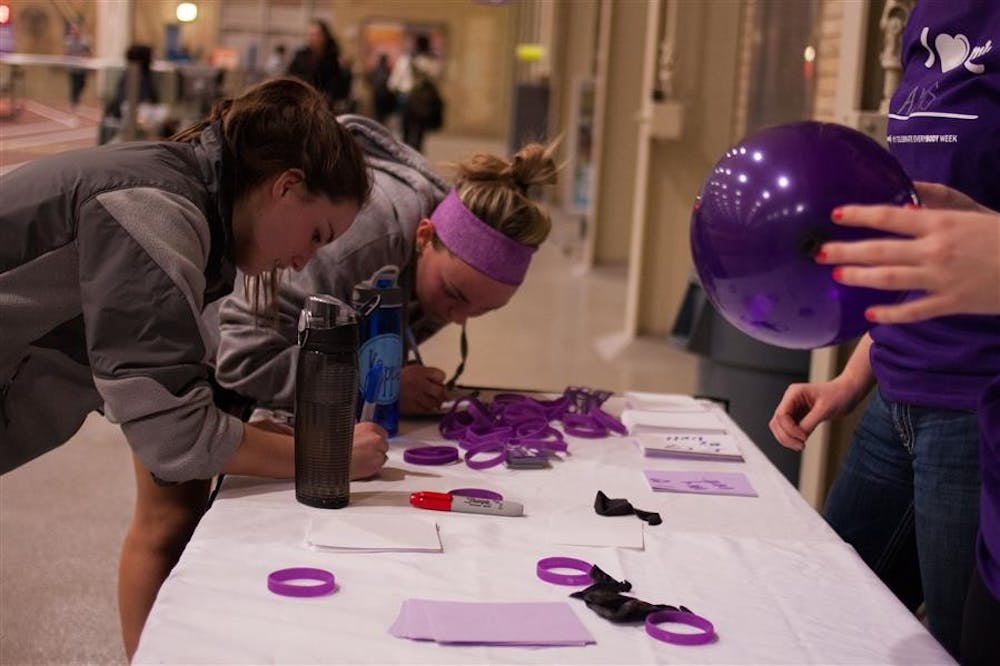Senior Becky Boyle was removed from campus by her parents Nov. 13, 2010.
She had packed nothing.
She thought she would be returning to class the next day.
She didn’t return until January.
Boyle was admitted to McCallum Place, an eating disorder treatment center in St. Louis.
Now a senior, Boyle began her battle with anorexia her freshman year. The disorder had progressed to a point where she had no other option but to take medical leave.
“You’re on lockdown,” Boyle said. “They put you on a ridiculous feeding schedule. They would lock the bathroom doors on us. But it’s either there or the hospital.”
She said her struggles did not revolve around achieving a certain body shape. They manifested out of a need to maintain control.
This week is “Celebrate EveryBODY Week,” an effort by IU Counseling and Psychological Services to promote positive body images.
The week is also National Eating Disorder Awareness Week, but CAPS decided to broaden the focus to encompass healthy body images overall, CAPS Director Nancy Stockton said.
“Celebrate EveryBODY Week” is not just about the body, but also the mind, Boyle said.
Boyle describes herself as a perfectionist. Since high school, she has taken maximum course loads, has been a competitive runner and has hardly ever missed a day of class.
Growing up as a quadruplet, Boyle said she couldn’t help but compare herself to her siblings. She wanted to fix the flaws she saw in herself.
But in searching for control, she lost it.
During her freshman year, Boyle began counting calories and exercising excessively.
The insecurities, depression and anxiety she felt in high school became worse as she struggled to adjust to college life, she said.
“I forced myself into a routine every day,” Boyle said. “If I could just cling to that schedule, all of the terrible emotions I felt, I didn’t have to deal with them.”
By November of her sophomore year, she had lost 20 pounds, along with her ability to concentrate in class. She started losing hair and feeling constantly cold. She isolated herself from her friends. Her roommate moved out on her.
“I was so unstable she didn’t want to be around me anymore,” Boyle said. “I didn’t want to live anymore.”
Boyle’s friends staged an intervention and took her to the health center, where she was diagnosed with anorexia nervosa.
Stockton said only about two to four students each semester have situations severe enough that require them to drop out of classes for residential treatment.
Boyle was one of those students.
“Many eating disorders are misunderstood,” Boyle said. “Everyone experiences them differently and everyone needs to be addressed differently.”
Most students with diagnosed eating disorders can continue to take classes while also receiving comprehensive psychological, dietary and physical counseling at the Health Center, Stockton said.
But it is often difficult for students to perceive that they have a problem, Stockton said.
For some students, an eating disorder might consist of extreme workouts or the use of steroids and drugs in attempts to refine their body as much as possible.
Wrestlers, for example, can engage in behaviors similar to eating disorders, Stockton said, but most will resume normal behavior after the season’s end, Stockton said.
Although it is often more difficult for men to seek out help, eating disorders do not discriminate, Stockton said.
Last year, IU Student Association President Kyle Straub used a public service announcement video to open up about his own experiences with eating disorders.
During his sophomore year in high school, Straub used extreme dieting as a way to cope with his difficulties coming out as a gay teenager, he said.
“It was like I was standing at the edge of the cliff,” Straub said. “The more you fall the harder it is to climb back up.”
Men make up nearly 1 million of the 11 million Americans with an eating disorder, according to Eating Recovery Center statistics.
Through therapy, Straub was able to fully recover from his eating disorder by the time he finished high school.
“I came out of it on top,” Straub said. “But I don’t want to pretend like it never happened.”
Boyle said she is now ready to be open about her disorder.
Using Tumblr, she has found a community in which she can connect with others battling eating disorders.
The last three years have been a continual process of recovery for Boyle.
“I know I still have a lot of issues,” Boyle said. “I’m not ashamed but I don’t want people to think it’s all OK now. I don’t think you ever completely get over it.”
Boyle continues to see a therapist and has to be careful to not over-exercise. But Boyle said she now uses running as motivation to stay healthy.
“It’s the best gift anyone could ever give me, being healthy enough to run and compete again,” she said.
One year after she was admitted to the eating disorder treatment center, Boyle raced at a national running club competition and placed second.
One year later, in 2012, she raced again.
She placed first.
EveryBODY week takes on special meaning for senior

Get stories like this in your inbox
Subscribe





